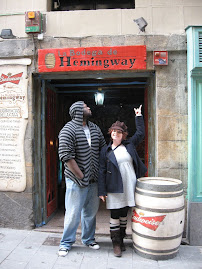I finished reading Simi Linton's book last night and found it enormously informative and insightful. I wish I had found this book at the beginning of last semester.
Points for discussion:
Disability studies enables scholars to understand "disability as a social, political, and cultural phenomenon" (2).
Differences b/t "disability" and "impairment"--disability is a social construction
"the field of disability studies is even more mariginal in the academic culture than disabled people are in the civic culture. The enormous energy society expends keeping people with disabilities sequestered and in subordinate positions is matched by the academy's effort to justify that isolation and oppression" (3).
The disabled "are all bound together, not by [the] list of our collective symptoms but by the social and political circumstances that have forged us as a group" (4). For my research, I see this statement as important because it is not the symptoms of autism but the circumstances that constitute "autism" as a definition. Definitions of autism are not medically based but socially and politically...
"vantage point of the atypical"... "atypical experience as deficit and loss" (5)
Disability studies grounded in humanities and social/political contexts, not psychology, because psychology endorses notion of "normalcy," which "centers and priviledges certain types of behavior, functioning, and appearance" (6), psychology's emphasis on empiricism, and psychology's emphasis on the individual rather than the environment (6).
"Disability studies, in contrast, focuses on the external variables: the social, political, and intellectual contingencies that shape meaning and behavior" (6).
"The scholarship and curriculum practices housed in academic institutions play a significant role in the perpetuation of a divided and unequal society" (7).
Discussion on the different labels and meanings behind them in Chapter 2.
"the medicalization of disability cast human variation as deviance from the norm, as pathological condition, as deficit, and, significantly, as an individual burden and personal tragedy. Society, in agreeing to assign medical meaning to disability, collude to keep the issue within the purview of the medical establishment, to keep it a personal matter and 'treat' the condition and the person with the condition rather than 'treating' the social processes and policies that constrict disabled people's lives" (11). This seems to relate well to criticisms of Autism Speaks by the neurodiversity movement. The problem with Autism Speaks for some is that the organization treats autistic individuals as "abnormal" through their emphasis on bio-medical interventions rather than addressing the social practices that disable, e.g., lack of group homes to insure a higher quality of life for disabled individuals.
"When medical definitions of disability are dominant, it is logical to separate people according to biomedical condition through the use of diagnostic categories and to forefront medical perspectives on human variation. When disability is redefined as a social/ political category, people with a variety of conditions are identified as people with disabilities or disabled people, a group bound by common social and political experience" (12).
Interesting point for discussion in regard to high/low functioning of autism--big deal in autism circles-- "The question of who 'qualifies' as disabled is as answerable or as confounding as questions about any identity status. [...] The degree and significance of an individual's impairment is often less of an issue than the degree to which someone identifies as disabled" (12). I would say that Linton's claims here do not necessary apply to autism discussions. Issue of ethos in regard to who can identify themselves as high/low functioning, who is even considered autistic.
Disability is determined by disclosure.
"Nice words" such as "physically challenged," "able disabled," "handicapable," and "special people/children" "may be considered well-meaning attempts to inflate the value of people with disabilities, they convey the boosterism and do-gooder mentality endemic to the paternalistic agencies that control many disabled people's lives" (14).
"Overcoming a disability" is really about overcoming the "social stigma of having a disability" (17). "the individual's responsibility for her or his own success is paramount." The disabled are required to "manage an inaccessible environment rather than demand that the community change to include them" (19).
"Shame and fear are personal burdens, but if these tales are told, we can demonstrate how the personal is indeed the political" (22).
Normal/Abnormal rhetoric is often used to describe "absolute categories" that maintains their "certainty by association with empiricism, and they suffer from empiricism's reductive and simplifying tendencies" (24).
"Language that conveys passivity and victimization reinforces certain stereotypes when applied to disabled people. Some of the stereotypes that are particularly entrenched are that people with disabilities are more dependent, childlike, passive, and miserable and are less competant then people who do not have disabilities" (25).
"disabled people are rarely depicted on television, in film, or in fiction as being in control of their own lives--in charge or actively seeking out and obtaining what they want and need. More often, disabled people are depicted as pained by their fate or, if happy, it is through personal triumph over their adversity. The adversity is not depicted as lack of opportunity, discrimination, institutionalization, and ostracism; it is the personal burden of their own body or means of functioning" (25).
"Victim" rhetoric casts the disability as the "active agent perpetuating an agressive act on a vulnerable, helpless 'victim'" (25). Rhetoric of "victim" markedly different when used to describe those "suffering from" or "afflicted with" HIV. Distinction is then made b/t "innocent" victims of blood transfusions and "complicit" victims of HIV from sexual contact and shared needles (26).
Other "victim" rhetoric: "afflict," "agonize," "excruciate," "rack," "torment," "torture" (26). Distinction b/t "living with" and "dying from" a disease. "Wheelchair bound" or "confined to a wheelchair" (27). "Invalid"
"Disabled people, who have often spent a great deal of time as patients, discuss the ways that we have been socialized in the medical culture to be compliant, and that has often undermined our ability to challenge authority or to function autonomously" (29).
the verb disable means "to deprive of capability or effectiveness" (30).
Thursday, June 21, 2007
Subscribe to:
Post Comments (Atom)








No comments:
Post a Comment